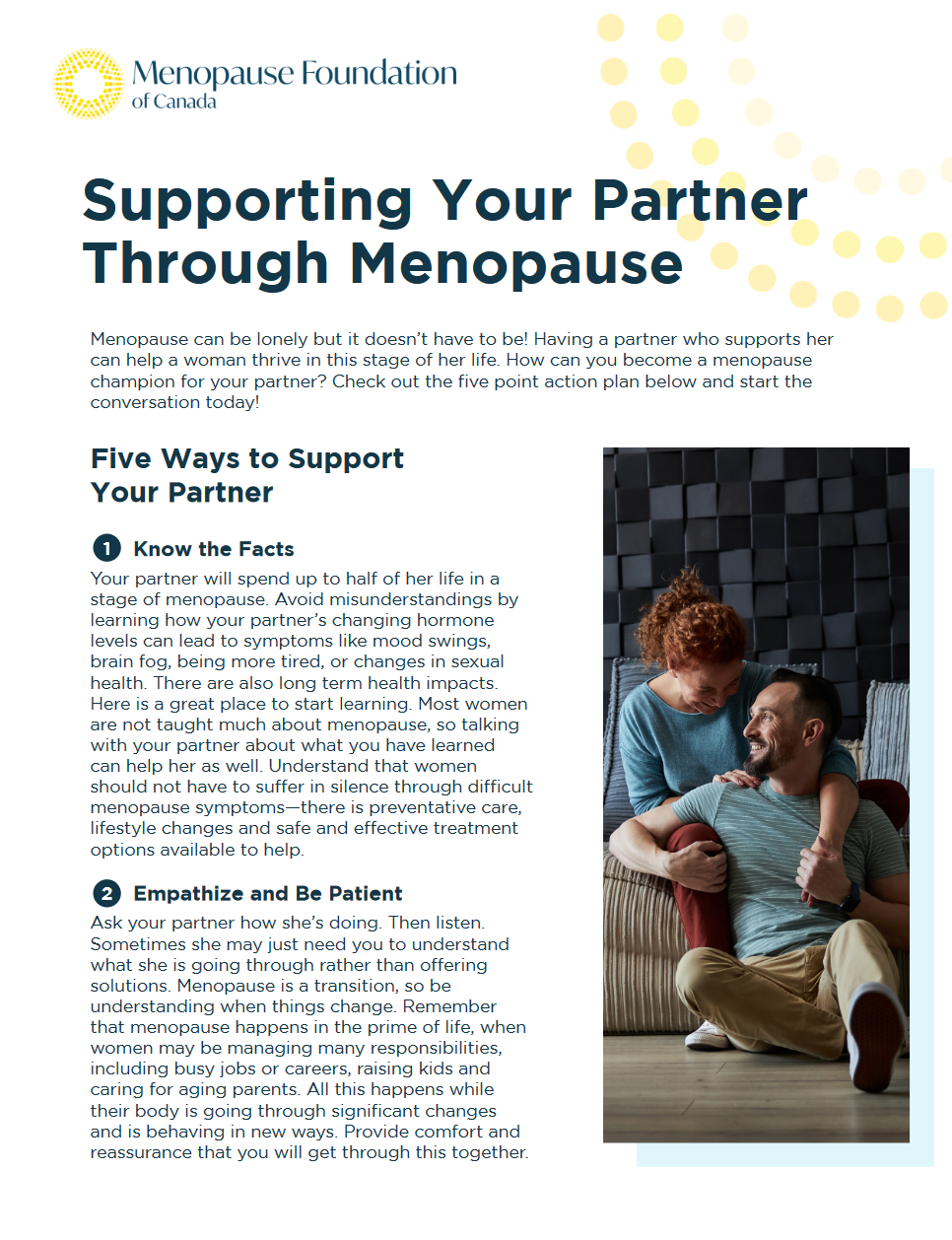
Supporting Your Partner Through Menopause
Menopause can be lonely but it doesn’t have to be! Having a partner who supports her can help a woman thrive in this stage of her life.
How can you become a menopause champion for your partner? Check out the five point action plan below and start the conversation today!

Five Ways to Support Your Partner
- 1
Know the Facts: Your partner will spend up to half of her life in a stage of menopause. Avoid misunderstandings by learning how your partner’s changing hormone levels can lead to symptoms like mood swings, brain fog, being more tired, or changes in sexual health. There are also long term health impacts. Here is a great place to start learning. Most women are not taught much about menopause, so talking with your partner about what you have learned can help her as well. Understand that women should not have to suffer in silence through difficult menopause symptoms—there is preventative care, lifestyle changes and safe and effective treatment options available to help.
- 2
Empathize and Be Patient: Ask your partner how she’s doing. Then listen. Sometimes she may just need you to understand what she is going through rather than offering solutions. Menopause is a transition, so be understanding when things change. Remember that menopause happens in the prime of life, when women may be managing many responsibilities, including busy jobs or careers, raising kids and caring for aging parents. All this happens while their body is going through significant changes and is behaving in new ways. Provide comfort and reassurance that you will get through this together.
- 3
Communicate: Create a safe space where you partner feels comfortable openly talking about how she is doing. Some women feel they aren’t meeting their own high standards during the menopause transition and can be very hard on themselves. Menopause often involves symptoms that can create misunderstandings in a relationship. Openly talking about things will help both of you feel seen and heard, help you be closer to each other, and strengthen your relationship. Great ways to start a conversation could be “Tell me what you’re going through” and “How can I help?
- 4
Provide Practical Support: Suggest your partner track her symptoms using the Menopause Foundation of Canada’s Symptom Tracker. Learn to recognize the physical symptoms of menopause, including hot flashes and vaginal dryness, so you can help lessen her discomfort; this can greatly improve the quality of life for your partner and for you. Go to menopause-related medical appointments with your partner if they would like you to; this is a great way for you to learn what they are going through and to show that you care. If your partner is struggling, encourage her to get help from a qualified health care provider. Let her know that there are lifestyle changes and safe and effective treatment options available to help.
- 5
Support a Healthy Lifestyle: Menopause can have a significant impact on a woman’s overall health and wellness. Join them in making healthy lifestyle choices, such as exercising regularly, eating a balanced diet, and making time for self-care.
What About You?
It is important to note that you may also be experiencing hormonal changes of your own. While it doesn’t get a lot of attention, we know that men have their fair share of mid-life challenges, including mental health struggles.
Females experience menopause at different ages, with some having very few symptoms, while others have many. That can leave some females in same-sex relationships struggling to understand their partner’s menopause experience. Being open and recognizing that you too may be going through mid-life changes could provide an opportunity to grow closer with your partner, and to provide each other with greater support.
Show your partner you are with them on their menopause journey. Provide them with a positive environment to help them navigate this transitional phase of their life. By doing so, you can strengthen your relationship and demonstrate you care about their overall well-being.
Life can be better for couples after menopause than before it!



